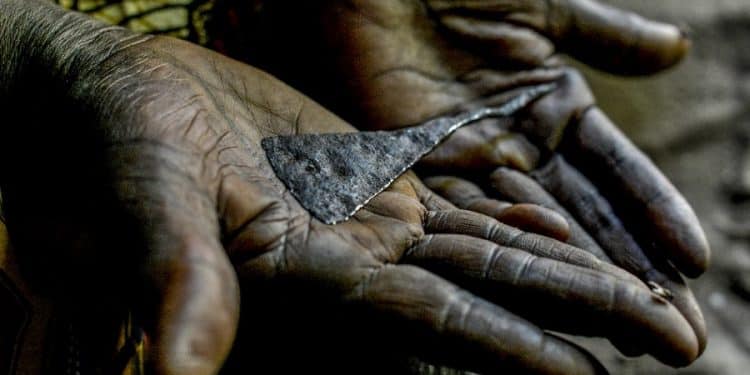Despite the preponderance of existing laws and policies aimed at reducing the scourge of Female Genital Mutilation/Circumcision (FGM/C), in Osun, Oyo and Ekiti states, little has been achieved in the area of enforcement due to lack of awareness.
According to a ‘Stop Cut Project’ research findings, which was designed to ascertain the prevalence, contributory factors and level of policy implementation of FGM/C in Oyo, Osun and Ekiti states, a total of 3,240 households participated in the study across 18 Local Government Areas.
The study population, which consisted of women of child-bearing age in the selected areas indicated that the data reported are key findings from the research to further guide the implementation activities against FGM/C.
It was, however, discovered that the existence of relevant laws and policies in the three states under review, do not reflect correctly the impact of ….. because of the poor level of awareness among critical stakeholders
The various calls by the bilateral organization and several African protocols, according to reports, inspired Nigeria to take concrete steps towards the eradication of FGM backed by the law.
Although Nigeria had signed the United Nations General Assembly resolutions in 1989 and adopted the Convention on the Rights of the Child (CRC) in 1994, there was no documented local Act or Legislation against FGM/C until 2003, when the Child Rights Act (CRA) was passed into law.
The law contains provisions that forbid this practice. Section 11(B) of this Act provides also that “no child shall be subjected to any form of torture, inhuman or degrading treatment or punishment”.
Besides, there was the National Health Act in 2014. The National Health Act (2014) contained a section that states that “a person who commits an offence regarding the removal of tissue will be punished under section 48(3)(a) with a fine of N1 million or imprisonment of not less than two years, or both”. It is however worthy of note that both the Child Rights Act and National Health Act did not explicitly mention FGM/C, rather it was implied.
It is worthy of note that the Violence Against Persons (Prohibition) Act, (VAPP Act) was signed into law by the then President Goodluck Jonathan on the 25th of May, 2015. It aims to eliminate all forms of gender-based violence in private and public life. This Act also criminalizes Female Genital Mutilation.
The Act explicitly stated that: “Attempting to perform FGM or engaging another to perform FGM carries a punishment of imprisonment not exceeding two years or to a fine not exceeding N100,000 or both. It also stipulated a fine of N200,000 or up to 4 years imprisonment for performing or engaging another to perform FGM/C.”
Ordinarily, these National laws were expected to be adapted and domesticated by different states with health being on the concurrent legislative list in the country. A drawback observed with this Act is that section 47 states that the Act applies only to the Federal Capital Territory, other states may likely have some of these laws stated in the VAPP Act being represented in their respective criminal code laws.
Ironically, according to reports, only 13 out of 36 states in Nigeria have their state laws expressly prohibiting FGM/C. These states are Lagos, Osun, Ondo, Ekiti, Bayelsa, Ogun, Delta, Ebonyi, Oyo, Imo, Edo, Cross-River and Rivers. The Federal Ministry of Health in conjunction with the Federal Ministry of Women Affairs and Social Development launched the National Policy’s and Plan of Action for the Elimination of FGM/C in Nigeria, which covered 2013/2017 to be coordinated by a multisector group, one of which is the UNFPA–UNICEF Joint Programme (UNJP).
In domesticating the National Laws, Ekiti State made a law in 2002 to prohibit female circumcision or genital mutilation in the state. The law titled: “The Female Circumcision (Prohibition) Law”, was passed by the Ekiti State House of Assembly and was clear on the prohibition of FGM/C as it states that:
“No persons shall circumcise or mutilate the genital organ of any female, whether or not her consent is obtained.”
This law empowers the Nigerian Police Force, officers of the Ministry of Health, Health officers and any other person authorized by the law to arrest any offender, and such offender shall be liable to a fine of N10,000 and prison sentence of up to 3 years. However, the law metes out the same fine for whoever is caught, be it the voluntary victim, the person who performs or induces or allows anyone to undergo mutilation.
As a follow-up, in 2011, another law was passed in Ekiti State known as the Ekiti State Gender-based Violence (Prohibition) law (No. 21 of 2011) with Section 2e classifying “traditional practices harmful to women such as Female Genital Mutilation, or attempting or aiding the mutilation of a woman or girl child genitals”, as violence against women as well as stating various penalties for gender-based violence offences in general.
This law has however been repealed and a new law was enacted known as Ekiti State Gender-Based Violence (Prohibition) Law 2019 to “incorporate the provisions of the Law, to prohibit female circumcision or genital mutilation in Ekiti State”. The latter has Section 7 covering female circumcision or genital mutilation.
The law explicitly states that “anyone who is found engaging in any action related to FGM is liable to a minimum of one-year imprisonment, N200,000 (Two Hundred Thousand Naira) fine or both. Where there is an attempt to commit the offence, a term of imprisonment not more than a year, a fine of a Hundred Thousand Naira (N100,000) or both are given. In a case where a person incites or abets another to commit the offence, The person is liable to the same fine as where there is an attempt to commit the offence.”
In the case of Osun State, the Female Circumcision and Genital Mutilation (Prohibition) Law by the Osun State House of Assembly, was assented to on 12th April 2005.
This law criminalizes violence against women in any way regardless of consent by the woman. This law implies that: “Offender of the law shall be any female who offers herself for circumcision or genital mutilation, any person who coerces, entices, counsels or induces any female to undergo circumcision or genital mutilation, any person who allows his/her daughter or ward to be circumcised or has the genital organ mutilated”.
This law however allows female circumcision if the purpose is to save the life of a woman in the hands of the surgeon. Such a woman must have been certified by a medical officer for such a procedure, according to UNICEF in 2018.
The punishment for violation of this law on first conviction was stipulated at a fine of N100,000, or imprisonment for 2 years. A subsequent offence will receive a penalty of two years jail term without the option of a fine. Section 7 of the law allow an offender to be arrested without a court warrant and there shall be no bail until a trial has been initiated.
Oyo State had instituted the Oyo State Child Right Law in 2006 and has domesticated the VAPP Act. Oyo State Government had gazetted the Violence Against Women Law, 2016 on 16th March 2017. The law also uses punishments and fines to enforce the eradication of Female Genital Mutilation in the state. Section 26 of the Oyo State Child Rights Law signed in 2006 dictates that: “Anyone who subjects a female child to genital mutilation is liable to pay a fine of N20,000 and a jail term not exceeding two years.”
Section 9 of the Oyo State Violence Against Women Law (VAWL) of 2016 states that: “Anyone who performs FGM is liable to pay a fine of N100,000 or a jail term not exceeding four years or both.”
In the same vein, according to VAWL, anyone who attempts the act or anyone who incites, aids, abets or encourages the process is liable on conviction to two years imprisonment or N80,000 fine or both.
Regrettably, according to findings, there are barriers against the implementations of the laws against Female Genital Mutilations/Circumcision. Despite various laws in each state, and the criminalizing and banning of FGM/C, this practice has not reduced significantly, and it is still of public health concern.
Unambiguously, there appears to be low political will in implementing the laws, as well as low levels of awareness of the existence of the laws among community members.
Many of the genital cutting performed on girls less than 18 years in Ekiti State was reported to have been performed by nurses/midwives (37.2%), 79.0% was performed by traditional circumcisers in Oyo State while 60.6% was performed by the traditional circumcisers in Osun State.
Also, based on the data sample, the overall prevalence of FGM/C in Oyo, Osun and Ekiti states among women 18 years and above is 47.9%, 76.8% and 52.6% respectively. Across all states, the age group 40 years and above had the highest overall prevalence. The prevalence rate among girls 17 years and below shows the level of the recent practice of FGM/C in the state. Ekiti State had the highest number of women with a girl less than 18 years old (43.4%) followed by Osun (36.4%) and Oyo State (26.0%).
Although, there are laws and policies to prohibit FGM/C in Osun, Oyo and Ekiti states, the awareness of these laws among women in all the states was abysmally low. Only 29.4%, 18.5% and 4.5% of the women in Osun, Ekiti and Oyo respectively were aware of the existence of these laws/policies. Ironically, more than half of the women across the three states were in support of the existence of the laws/policies against FGM/C (Oyo, 61.5%; Osun 59.6%; Ekiti 54.8%).
It is however a matter of regret that despite the existence of laws against FGM/C and law enforcement agencies, very few women were willing to report a case of FGM/C in their community. The number of women who were willingly varied across the states, 23.6% in Ekiti, 29.1% in Osun and 32.8% in Oyo. Most of the women in all three states would prefer to report FGM/C cases anonymously through a dedicated phone line. This shows a lot of women value anonymity and an FGM/C whistle-blowing policy could encourage an increase in reporting.
Meanwhile, over 125 million girls and women alive today in 29 countries in Africa and the Middle East have been a victim of Female Genital Mutilation/Cutting (FGM/C). Annually, over 3 million girls are at risk of being subjected to FGM/C.
FGM/C is a violation of the basic human rights of the women and girls made to undergo this practice. Most times, it is usually done against the person’s wish and it causes almost irreversible damages to the victims. In Nigeria, the prevalence of FGM/C is 24.8% and about 20 million women and girls are reported to have been mutilated or cut.











